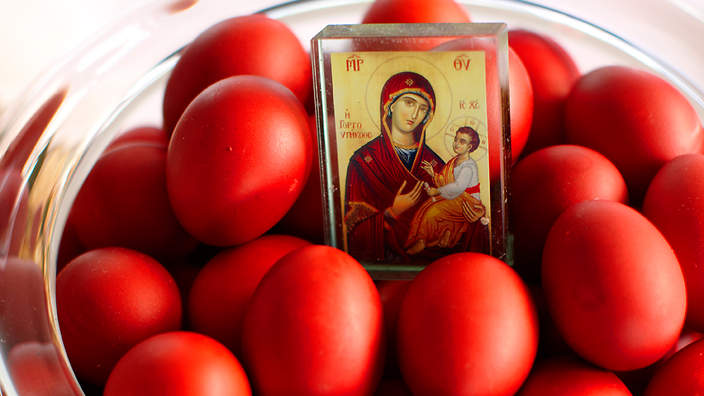All You Need to Know About Orthodox Easter (mostly)
May 3, 2023
Easter is a pretty big thing for Christians. Celebrating Jesus Christ’s death and resurrection is done in many different ways depending on tradition, culture and denomination. So different is the celebration, that even the day isn’t the same! If you have Orthodox friends or are yourself Orthodox, you will probably be aware that Orthodox Christians celebrate easter on a separate day from Catholics, Anglicans, Protestants and most other Christian denominations. So when is it? And why is it so different?
Easter, as most of you will know, falls on the first Sunday after the first full moon on or after the March equinox. Orthodox easter, on the other hand, falls on the first full moon on or after Passover which can be anywhere from the same date as non-Orthodox easter to 3 weeks after. Taking a step back, the March equinox, the moment the sun crosses the celestial equator, lands somewhere around March 21st and was a more important event in Roman times than it is today.
The reason there is no set date for Orthodox Easter is because unfortunately, the bible does not specify and thus it is somewhat of an estimated guessing game. Orthodoxy has decided that because the bible states that Jesus entered Jerusalem to celebrate the Passover, the date for easter should be based on that. There is no right or wrong date for Easter and all denominations still celebrate the same thing. However, due to the creation of the Gregorian calendar, a division of dates occurred between denominations. All that is a fancy way of saying that different groups of Christians believe that the day of easter is different despite celebrating the same thing.
As for Orthodox Easter traditions, well I’m only really qualified to speak about Greek Orthodox traditions as opposed to Russian Orthodox, Coptic or other Orthodox denominations as myself and my family is Greek Orthodox. One of the big pre-easter traditions that happen is fasting. How this works differs depending on the church you attend and your commitment but usually, there are either 2 or 4 weeks of eating no meat or animal-related products in the lead-up to easter. This specific tradition, however, isn’t specific to Orthodoxy as Catholics also tend to fast before easter. The more fun traditions happen on easter weekend. For churchgoers, there is a service on the night of Good Friday and a Midnight Mass on the Saturday night leading into Easter morning which is a big tradition where people will walk around the church with candles and so on.
On easter day there are a lot of shared traditions between Orthodox faiths including the use of dyed eggs instead of the modernised chocolate eggs. These eggs are hard-boiled and then dyed (usually red or green) in preparation for a competition that takes place on Easter Sunday. In this competition, every person will grab a dyed egg and attempt to use it to crack someone else’s egg by hitting the tips of the eggs against each other. In the end, there is usually one egg left unscathed whilst the others remain cracked, the reward for the winner differs for each family but for my family, it’s usually that they get the first helping of food. This competition takes place instead of an easter egg hunt and in my opinion, is more fun. Just to clarify before we move on, most Orthodox families still have chocolate eggs as gifts and for fun eating afterwards, but they are not a part of easter celebrations. (a perk is that we get them on discount most years because we can buy them after non-Orthodox easter)
Other traditions, such as what food is prepared and any other games and celebrations differ depending on culture and familial differences although the preparation of a large lamb dish is very traditional and the baking of an easter sweetbread called Tsoureki is usually commonplace.
Hopefully, you are all now a bit more informed when you hear the term ‘Greek’ or ‘Orthodox’ easter as to its origins or traditions. Due to the different dates and general lack of discussion, it is very easy to get confused and think that it is a celebration of a different religion or some completely different holiday. In reality, easter is easter no matter when you celebrate it, and easter, in all denominations, is still celebrating the death and resurrection of Jesus.













